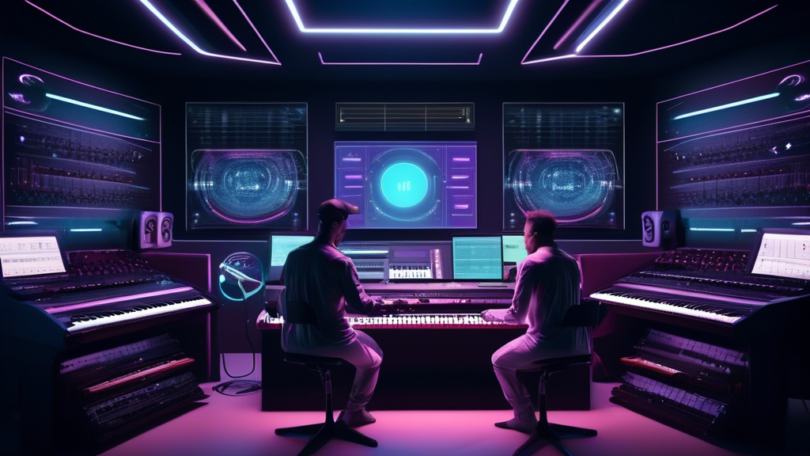In recent years, the confluence of artificial intelligence (AI) and the music industry has created a vibrant, yet complex landscape. As AI technology advances at an unprecedented rate, its impact on various sectors within the music industry becomes increasingly significant, and nowhere is this influence more pronounced than in the realm of music licensing. Music licensing, the process that allows the use of music by third parties legally, has always been crucial for ensuring that music creators receive fair compensation for their work. However, the advent of AI has introduced new dynamics to this already intricate field.
The digital age has transformed how music is created, distributed, and consumed. With the vast array of platforms and services now available, modern music licensing must adapt to an environment where vast quantities of music are produced and shared worldwide. This evolution necessitates a rethinking of traditional licensing models to account for the capabilities and challenges posed by AI technologies. From sophisticated algorithms that generate new compositions to advanced tools that automate administrative tasks, AI presents both opportunities and hurdles that stakeholders in the music industry must navigate.
This article delves into the dualistic nature of AI’s influence on music licensing. On one hand, it explores the formidable challenges that AI introduces, such as legal and ethical questions surrounding intellectual property rights, the complexity of tracking AI-generated content, and the potential displacement of traditional music creators. On the other hand, it highlights the promising opportunities that AI offers, including the potential to streamline licensing processes, improve royalty distribution through data analytics, and inspire innovative business models and revenue streams. By examining these facets, we aim to provide a comprehensive understanding of how AI is reshaping music licensing, arming industry professionals with the insights needed to adapt and thrive in this evolving landscape.
The Intersection of AI and Music Licensing
The emergence of Artificial Intelligence (AI) has rapidly transformed various sectors, and the music industry is no exception. AI technology has revolutionized the way music is created, distributed, and consumed. In particular, it has brought remarkable changes to music licensing – a complex field responsible for ensuring that artists and creators are properly compensated for their work.
AI’s influence begins with its ability to produce music. Algorithms can now generate entire compositions, mimic distinct styles, and even enhance or remix existing tracks. This has created a new genre of AI-generated music that stands alongside traditional compositions by human artists. Consequently, the boundaries between human creativity and machine assistance are becoming increasingly blurred.
The digitization of music has necessitated a sophisticated licensing framework. Modern music licensing must address the complex landscape of digital music streaming services, online platforms, and global distribution channels. In this technology-centric era, licensing is about more than just permissions and payments—it’s about managing data, rights, and royalties in real-time. Given the reach of platforms like Spotify, Apple Music, and YouTube, accurate and efficient licensing is imperative for ensuring that revenue is fairly distributed among rights holders.
With AI stepping into this space, the licensing process faces both new challenges and unprecedented opportunities. The capabilities of AI—when optimally utilized—promise to streamline cumbersome processes, offer precise data analytics, and potentially create entirely new revenue streams through innovative business models. However, the ascendancy of AI also brings forth a host of legal, ethical, and economic concerns that must be navigated with care.
Thus, exploring the impact of AI on music licensing is crucial. This examination will address the dual aspects of the challenges and opportunities presented by AI in the realm of music licensing. By understanding these dynamics, industry stakeholders can better prepare for an evolving musical landscape driven by cutting-edge technology.
Challenges Posed by AI in Music Licensing
The advent of artificial intelligence (AI) in the music industry has not come without its obstacles. As music licensing becomes more intertwined with AI technologies, numerous challenges arise that pose significant implications for legal, ethical, and practical aspects of the industry.
Legal and Ethical Implications: Intellectual Property Rights and Copyright Issues
One of the most complex challenges introduced by AI in music licensing is the barrage of legal and ethical issues surrounding intellectual property rights and copyright protection. Traditionally, the intellectual property rights over a piece of music are fairly clear-cut, usually belonging to the composer, lyricist, and sometimes the performer. However, with AI-generated music, these boundaries become blurred.
AI can generate music with minimal human intervention, raising the question of who owns the resultant work. Current copyright laws are not adequately designed to handle creations by non-human entities, leading to significant legal ambiguities. This ambiguity can result in prolonged legal disputes, impacting how AI-generated content is monetized and licensed. Resolving these issues requires further updates in copyright regulations that explicitly address AI-generated works, a process that can take considerable time and effort from stakeholders and lawmakers.
Difficulty in Tracking and Managing AI-Generated Content
Managing and tracking AI-generated music adds another layer of complexity to music licensing. Due to the sheer volume of content that AI can produce, traditional methods of monitoring and cataloging music become less effective. This massive influx of AI-generated tracks calls for more sophisticated tracking systems that can keep up with the pace of production.
Current music identification technologies like digital fingerprinting and watermarking may not be fully equipped to handle this surge. Inefficient tracking can result in unauthorized use or improper licensing of AI-generated music, causing legal conflicts and financial losses for stakeholders. The music industry must invest in advanced tracking systems and collaborate with technology providers to ensure that AI-generated content is adequately managed.
Potential Negative Impact on Traditional Music Creators and Their Revenue
AI’s presence in the music industry poses a potential threat to traditional music creators, who might see their revenue streams diminish. AI-generated music can be produced at a fraction of the cost and time it takes for human musicians to create original works. This economic advantage may lead to a preference for AI-generated content over traditional music, affecting the livelihoods of composers, songwriters, and performers.
Moreover, AI-driven music’s pervasive availability can saturate the market, making it more challenging for human artists to differentiate themselves and gain recognition. The oversupply of music can also dilute the overall value of music as a commodity, compressing the payouts artists receive from licensing deals and streaming platforms. Addressing these issues requires the development of fair compensation models that balance the interests of both AI-generated and human-created music.
Summary of Challenges
The challenges posed by AI in music licensing are multifaceted and require comprehensive strategies to address. Legal frameworks need updating to account for AI-generated works, while technological advancements in tracking and managing music are essential for effective content control. Protecting the interests of traditional music creators amidst the AI influx is also crucial to ensure sustainability and fairness in the industry. While these challenges are significant, they are not insurmountable, and industry-wide collaboration is key to navigating this AI wave effectively.
Opportunities Presented by AI in Music Licensing
In the evolving landscape of the music industry, Artificial Intelligence (AI) presents numerous opportunities for revolutionizing the music licensing landscape. While challenges exist, the positive potential of AI is immense, providing innovative solutions to streamline processes, enhance data analytics, and create new business models. As AI continues to integrate more deeply into the music industry, the ways licenses are managed and music is created can dramatically shift, offering several key advantages.
Streamlining the Licensing Process with AI Tools and Automation
One of the most significant opportunities AI brings to music licensing is the ability to automate and streamline the traditionally cumbersome processes involved. AI-powered tools can handle large volumes of data with greater efficiency than manual methods. This includes identifying music used in various media, tracking plays across multiple platforms, and ensuring that copyrights are respected.
AI systems can rapidly scan audio files to detect the use of copyrighted material, ensuring that proper licensing requirements are met and reducing the risk of copyright infringement. This automation minimizes the manual workload for rights holders, licensing companies, and music platforms. Moreover, AI can facilitate the creation of smart contracts that automate royalty payments whenever and wherever music is used, ensuring timely and accurate compensation for artists and rights holders.
By leveraging machine learning algorithms, these tools can also predict high-demand licenses, enabling rights holders to negotiate better deals or adjust pricing models dynamically based on anticipated usage. Overall, AI-driven automation reduces the time, cost, and complexity involved in music licensing, leading to more transparent and efficient processes.
Enhanced Data Analytics for Better Royalty Distribution and Rights Management
The use of AI in data analytics offers another substantial opportunity for improving music licensing. AI can sift through extensive datasets to provide insights into music consumption patterns, which is crucial for accurately distributing royalties and managing rights. By analyzing streaming data, social media engagement, and other metrics, AI can pinpoint exactly when and where a piece of music is being used.
This granular level of data analysis ensures that all contributors to a piece of music—from songwriters and performers to producers—are fairly compensated according to their share of the work. Advanced algorithms can dissect streaming platform data and allocate royalties in real-time, reducing disputes over payments and ensuring transparency in the distribution process.
Additionally, AI can enhance rights management by automatically updating databases when new works are created, licensed, or used. It can track the usage of music across different territories and platforms, helping to avoid conflicts and ensuring compliance with various legal jurisdictions. This not only protects intellectual property but also helps artists and rights holders to maximize their revenue potential by tapping into global markets.
The Rise of New Business Models and Revenue Streams through AI-Driven Music Creation and Curation
AI’s role in the music industry goes beyond improving existing processes—it also unlocks new creative and commercial possibilities. AI-driven music creation tools can compose original music tailored to specific needs, from commercial jingles to full-length albums. This technology enables the production of high-quality music at a fraction of the cost and time required by traditional methods.
AI-powered recommendation systems and curatorial tools also offer fresh ways for music to reach audiences. By analyzing listener preferences and behavior, AI can curate personalized playlists or suggest new artists, enhancing the user experience and boosting music discovery. These tools benefit both consumers, who get more relevant content, and creators, who gain increased exposure and potential revenue opportunities.
Moreover, AI facilitates the development of innovative business models. For instance, subscription services that use AI to deliver bespoke music experiences or platforms that allow users to commission AI-generated music are just some examples. Such models can generate alternative revenue streams for labels and rights holders, tapping into markets that were previously unattainable.
Furthermore, the integration of AI with blockchain technology could pave the way for more secure and transparent royalty distribution systems. These decentralized systems ensure that every transaction is recorded immutably, reducing the chances of fraud and ensuring that revenues are fairly allocated and tracked.
In conclusion, while AI presents certain challenges to music licensing, its opportunities far outweigh the problems by offering innovative solutions that enhance efficiency, accuracy, and fairness. As the industry continues to adapt to these advancements, the potential for growth and improvement remains considerable, presenting exciting new frontiers for all stakeholders involved.
As the curtains close on our exploration of the interplay between artificial intelligence and modern music licensing, it becomes evident that this technological wave is reshaping the landscape in profound ways. The integration of AI into the music industry marks a new era of possibilities, bringing to the forefront both considerable challenges and transformative opportunities.
First and foremost, the legal and ethical implications of AI in music licensing present a formidable obstacle. Intellectual property rights and copyright issues are at the heart of these concerns, raising questions about ownership, originality, and the protection of creative works. Additionally, the sheer volume and complexity of AI-generated content pose difficulties in tracking and managing these intellectual properties effectively. This technological shift has the potential to disrupt traditional revenue models, posing a threat to music creators who rely heavily on established systems for their livelihood.
Despite these challenges, AI also offers promising avenues for innovation and efficiency. One of the most significant benefits lies in the potential to streamline the licensing process through automation and advanced AI tools. By leveraging these technologies, stakeholders can navigate the often cumbersome and time-consuming licensing procedures with greater ease and accuracy. Moreover, AI-powered data analytics can revolutionize royalty distribution and rights management, ensuring that artists and rights holders receive fair compensation for their work.
Furthermore, AI’s role in music creation opens up uncharted territories for new business models and revenue streams. AI-driven music curation and composition can cater to diverse tastes and preferences, offering personalized and dynamic musical experiences to listeners. This not only enriches the consumer experience but also creates novel opportunities for monetization and audience engagement.
In conclusion, navigating the AI wave in modern music licensing is a complex yet exhilarating journey. While the challenges of legal and ethical implications, intellectual property management, and the potential impact on traditional music creators cannot be ignored, the opportunities for enhanced efficiency, fairer royalty distribution, and innovative business models are equally compelling. As the music industry continues to evolve, stakeholders must strike a delicate balance, embracing AI’s groundbreaking capabilities while safeguarding the rights and interests of creators. This harmonious coexistence of technology and artistry will ultimately pave the way for a dynamic, inclusive, and thriving musical ecosystem.








